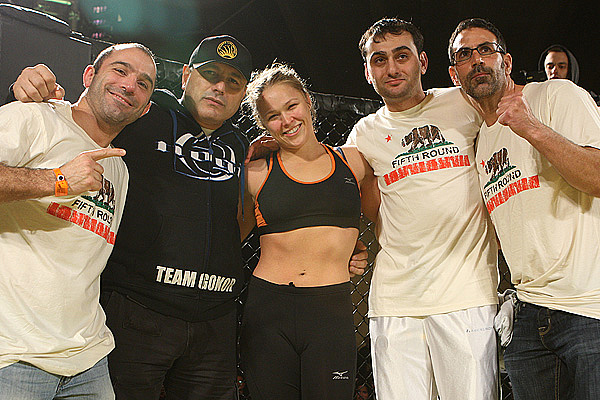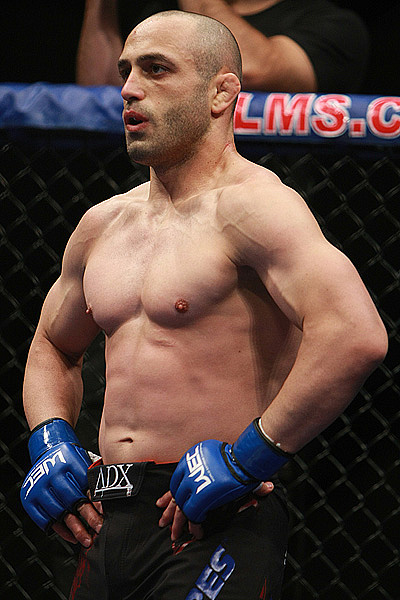Olympian No Stranger to Center Stage
No Stranger to Center Stage

Ronda Rousey (center) makes her Strikeforce debut this Friday. |
Photo: Dave Mandel
“Rowdy” Ronda Rousey will make her anticipated promotional debut at Strikeforce Challengers 18 on Friday at the Palms Casino Resort in Las Vegas, but it will hardly be the biggest stage with which she has ever contended.
The American judoka qualified for the 2004 Summer Olympics in Athens, Greece, at just 17 years of age and was the youngest judo player in the entire competition. Her judo accomplishments and medals are too many to list, though she may be best known for her run at the 2008 Summer Olympics in Beijing, where she won bronze and became the first American to medal in women’s judo since its inception as an Olympic sport in 1992.
Advertisement
“I just don’t feel as intimidated by venues as other people are,” Rousey tells Sherdog.com. “The Olympics are such a big deal, and it’s every four years. If you have an MMA fight in a small venue every two months, it’s just not as intimidating to me as I feel like it would be to other people that aren’t used to fighting on the big stage in front of a lot of people.
“And plus, whenever I did judo, I was used to the referees always
wanting me to lose and the crowd always booing me,” she adds. “It
actually seems a lot easier now, where I feel like it’s more of a
level playing field and a lot of the time I have the crowd behind
me.”
Because of the bias against American competitors in judo, Rousey’s mother -- the first American to win the Judo World Championships -- always trained her with the idea that she would have to be good enough to win every match twice on a bad day.
“You’re not always going to have a good day,” Rousey explains, “and they’re not always going to give it to you the first time.”
Although Rousey found success in judo early in life, competing at such a high level created its own set of social issues.
“It was hard because I never really went to a single party in high school. I think I went to like, one, because every Friday night I was training; every Saturday I was training,” she says. “I didn’t really have a social life outside of judo, and everybody I knew in school couldn’t really understand what I was doing. I mostly got made fun of for it. Everyone thought it was some stupid karate thing, and everyone gave me s--- about my big arms and my ears and I felt very largely misunderstood in my school because of that.

D.
Mandel
Gamburyan trains with Rousey.
However, judo had also lost its lure for Rousey.
“I guess I didn’t really enjoy training anymore,” she says. “I didn’t really enjoy the lifestyle. It was very monotonic, and it just wasn’t very stimulating to me anymore.”
Necessary Transition
Rousey wanted more of a test, which is why she decided to transition from judo to mixed martial arts.
“In MMA, I learn completely new things every day,” she says. “I got to this point in judo where I was just learning how to do things that I already knew better, and it wasn’t really stimulating or challenging or fun anymore; and I was more relieved when I won, instead of happy. It wasn’t for me anymore.”
Switching sports was challenging at first.
“I was so used to people having handles on them,” Rousey says. “All of my favorite throws expose my back, so I had to modify some things.”
The 24-year-old Californian claims it was not much of a stretch. She now prefers the faster pace of training without a gi.
“If you ever watch a Brazilian jiu-jitsu match, it’s very slow and meticulous because you have so much more leverage if you have something to grab,” Rousey says, “whereas with [no-gi] grappling, you can take more risks and try more fun things.”
Rousey received some criticism early in her MMA career for daring to say she wanted to fight some of the top names in her weight class, including Strikeforce women’s middleweight champion Cristiane “Cyborg” Santos.
“I wasn’t calling them out to be, like, ‘I’ll fight you right now,’ but there’s no way I would intend on starting a sport without thinking I could be the best at it. I mean, I think you have to believe you’re the best to be the best,” she says. “It’s not like you’re fighting and training all your life, and then, finally, on Sept. 22, you’re like, ‘Oh, I’m suddenly the best in the world today!’
“You have to believe it from the very beginning, and for people to think that I should think less of myself and think that I’m not capable of doing something … maybe they haven’t heard enough in their life that they are capable of doing anything,” Rousey adds. “There’s a difference between being self-confident and being cocky, and I think that, given enough work, I can do anything, and if anyone doesn’t believe me, then I’ll just have to prove them wrong.”
Finish Reading » Olympian No Stranger to Center Stage: Great Expectations
Related Articles






